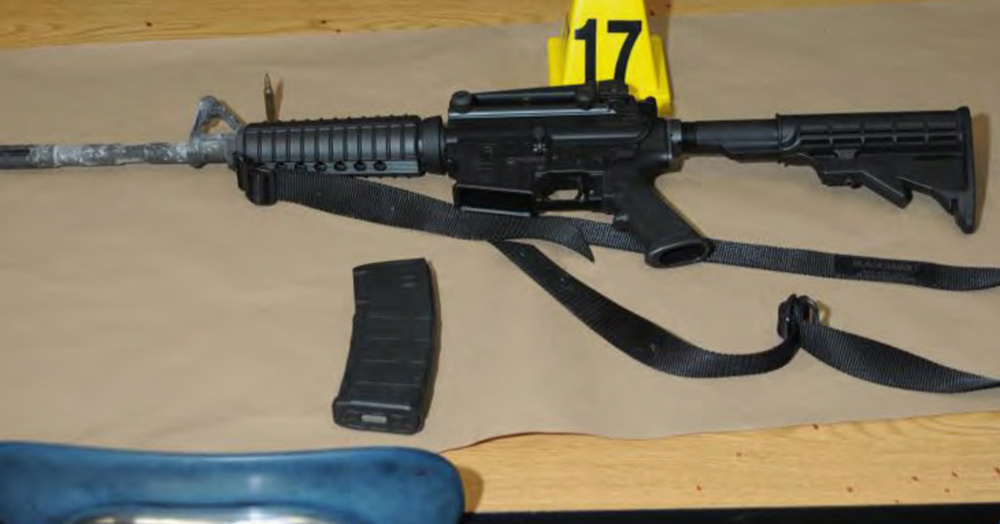It’s bad enough that Congress allows military assault-style weapons to be sold to the general public, making instruments of mass carnage available for the price of a laptop computer. Making matters worse, lawmakers have granted the gun industry near-blanket protection from liability for the damage inflicted with their weapons, unlike other companies that make or sell deadly products.
That shield against liability — the Protection of Lawful Commerce in Arms Act — was passed in response to a wave of lawsuits in the late 1990s against gun manufacturers and dealers for injuries and deaths caused by their goods. Last week, however, the Connecticut Supreme Court issued a ruling that might open a narrow breach in the outrageous legal wall protecting the industry.
The case centers on a lawsuit filed by families of nine victims of the 2012 gun massacre at Sandy Hook Elementary School. The plaintiffs argue, among other things, that Remington, the manufacturer of the Bushmaster XM15-E2S semiautomatic rifle used in the massacre, should have reasonably foreseen that its advertisements touting the Bushmaster as, in effect, a weapon of war would lead someone to use it as one.
As we’ve argued many times before, civilians have no business owning such firearms. Setting aside the broader debate over the proper level of gun control, these weapons of war should not be kept in neighborhood gun lockers, stuffed in closets, or — as is allowed in some states — carried around in the open under the pretext that the 2nd Amendment confers us all the right to walk around armed like soldiers of fortune. Congress did manage in the mid-1990s to ban assault-style weapons from civilian life temporarily, at the urging of Sen. Dianne Feinstein (D-Calif.), but it let that ban lapse in 2004.
Lawmakers compounded the problem the next year by protecting the gun industry from being held accountable for the use of its products. While it may be legal to manufacture these weapons, no one compels the gunmakers to do so. They opt to design, manufacture and market these weapons with a stunning obliviousness to the carnage those sales can lead to.
As long as guns can be sold, people whose lives are upended when someone like Adam Lanza, the Sandy Hook killer, uses such a weapon should be able to haul those they believe liable into court to try to persuade a judge and jury that the maker and seller bear some responsibility. They may not be able to prove Remington to be responsible in this case, but the victims in such incidents and their families should not be shut out of the courtroom because the gun lobby put in the fix with its water-carriers in Congress. The gun industry should bear the same liability risks as any other product manufacturer or seller — no more, and certainly no less.
The judge in the Connecticut case allowed the claims to move forward because of a narrow exception to the federal ban on gun-industry lawsuits. The Protection of Lawful Commerce in Arms Act allows some lawsuits, such as those over a defectively designed or manufactured gun, or if the maker or dealer broke state or federal laws in selling or marketing the gun.
While the courts rejected most of the arguments posed by the Connecticut families, the state Supreme Court agreed last week that Remington’s macho and militaristic ad campaign for the Bushmaster may violate a Connecticut law barring companies from unscrupulous and unsafe marketing. Unless the case is successfully appealed to the U.S. Supreme Court, it will now be up to a jury to decide whether the defendants broke the Connecticut law “by marketing the XM15- E2S to civilians for criminal purposes, and that those wrongful marketing tactics caused or contributed to the Sandy Hook massacre.”
It’s hard to say whether the lawsuit by the Sandy Hook victims will succeed. Other lower courts have upheld the federal liability-protection law, raising the likelihood that the U.S. Supreme Court — which has taken on a gun-friendly tilt of late — will agree to hear an appeal if Remington files one. And even if it goes to trial, the case details get problematic.
Lanza’s mother had lawfully obtained the weapons; Lanza killed her, then took the guns to school and unleashed his horrific attack. Is Remington responsible for Lanza’s rampage because it marketed Bushmaster rifles as he-man death machines? That connection may be difficult to prove. But it’s an argument the families should have a right to make in court.
Editorial by the Los Angeles Times
Visit the Los Angeles Times at www.latimes.com
Distributed by Tribune Content Agency, LLC.
Send questions/comments to the editors.



Success. Please wait for the page to reload. If the page does not reload within 5 seconds, please refresh the page.
Enter your email and password to access comments.
Hi, to comment on stories you must . This profile is in addition to your subscription and website login.
Already have a commenting profile? .
Invalid username/password.
Please check your email to confirm and complete your registration.
Only subscribers are eligible to post comments. Please subscribe or login first for digital access. Here’s why.
Use the form below to reset your password. When you've submitted your account email, we will send an email with a reset code.